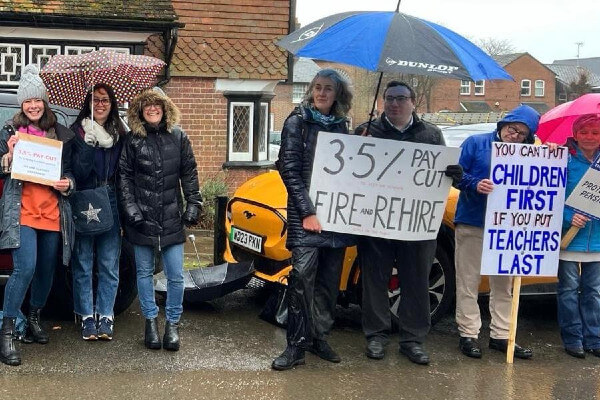Tring Park School Concerns over Pension Scheme

Staff at Tring Park School for the Performing Arts are currently undertaking industrial action as a response to the school’s proposal to review its contribution to the Teacher’s Pension Scheme.
In an open letter to parents from the unions NEU and NASUWT, it is stated that teachers are being asked to accept a 3.5% pay cut to subsidise the 5% point increase in employer’s contributions, in order to remain full members of their pension scheme. Teachers have also received no guarantee that the process of Fire and Rehire will not be used to enforce revised contracts dictating worse conditions of employment.
Staff are concerned that removing full access to the pension scheme will negatively affect recruitment and retention of quality teachers, which is already challenging, given the comparatively low pay rates. One former senior employee has shared via social media that the school ‘simply won’t get enough candidates through the door to see what a lovely place it is’.
After reviewing the evidence, teachers believe that the school’s finances are sufficiently stable for them to remain in the scheme with their membership being fully funded by the school. The NEU reports via Instagram that teachers even provided the school with a 5 page document listing potential areas that they could cut back, without affecting the pension scheme.
Interestingly, teaching staff have been prohibited from directly contacting parents or alumni regarding the strikes – perhaps in an effort to avoid a repeat of the backlash which the school received during a similar dispute in 2021.
In response, we have received the below statement from Simon Larter-Evans, Principal at Tring Park School for the Performing Arts.
‘Tring Park School for the Performing Arts has always been committed to the well-being of its teaching staff, including providing a sustainable and beneficial pension scheme. However, considering the historic changes to the Teacher Pension Scheme (TPS), the imminent increase in employer contributions, and unknown potential future increases, we have been forced to reevaluate our current pension funding approach.
‘The School’s teachers are currently offered membership of the Teachers’ Pension Scheme (TPS). The TPS is a public sector defined benefit pension scheme in respect of which HM Government sets the level of contributions which must be made by members and their employers. The rates of contribution are set by way of four yearly valuations of the scheme over which the School has no control.
‘In October last year it was announced that the TPS employer contribution rate will rise by over 20% (from 23.68% to 28.68% of teachers’ salaries) from April 2024. This follows an increase from 16.48% to 23.68% in September 2019. This latest increase presents a significant financial risk to the School and Governors are concerned that the associated cost may not be affordable without compromising the quality of education that the School provides to its students given our budgetary constraints.
‘The principal difficulty that independent schools face is that the additional employer contribution under the TPS comes straight out of the fees which parents pay, whereas in the State Sector it is funded by the taxpayer. This has compelled a significant number of independent schools to leave the TPS or put in place alternative arrangements.
‘It is important to highlight that, unlike many schools, we are not proposing to remove the TPS as a benefit for existing eligible staff or to reduce the cost of the current 23.68% employer contribution. We fully understand the value that many of our staff place in the TPS, and therefore wish to retain the ability for current staff to remain in the TPS, if they wish to do so.
‘We are therefore proposing that a hybrid pensions option be introduced for our teachers which means that the School would both remain in the TPS and introduce a new defined contribution pension scheme to run alongside it.
‘The consultation is ongoing, and no decisions have been made. In this context, it is disappointing that the NEU and NASUWT have instigated industrial action. We are taking all appropriate steps to mitigate the impact of that action on pupils and parents.
‘Our priority remains to maintain the highest standards of education whilst ensuring fair compensation and benefits packages for the teachers that make that possible. We will continue to work closely with our staff and parents to ensure they are fully informed and supported during this period.’
